 Ships in Harbour a Source of Air Pollution -- To be Plugged... In.
Ships in Harbour a Source of Air Pollution -- To be Plugged... In.
Commerce and tourism are two important parts of the economy of many communities and MetroVancouver¹ is one of those places where it plays a very important role. With that importance comes a price and there are prices in polution to be paid to do with the port.
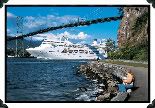 Something many people might not consider -- when looking at the powerful freighters moored in the harbour or docked at the term; or watching the graceful cruise ship sailing under Lions Gate Bridge (image to left -- image from Dubman Tours) to dock at the passenger terminals -- is that those ship while parked keep engines running the whole time in order to run generators for electral works and other systems on the ship the whole time in port. Undoubtedly they aren't running their main engines and producing the same amount of exhaust as they would at sea, but they do produce a substantial ammount. I was surprised recently reading how substantial it is and on a percentage basis how much it might become.
Something many people might not consider -- when looking at the powerful freighters moored in the harbour or docked at the term; or watching the graceful cruise ship sailing under Lions Gate Bridge (image to left -- image from Dubman Tours) to dock at the passenger terminals -- is that those ship while parked keep engines running the whole time in order to run generators for electral works and other systems on the ship the whole time in port. Undoubtedly they aren't running their main engines and producing the same amount of exhaust as they would at sea, but they do produce a substantial ammount. I was surprised recently reading how substantial it is and on a percentage basis how much it might become.
Collectively, ship exhaust emissions comprise one of the biggest sources of air pollution in the Metro-Fraser Valley region - port electrification would allow marine vessels to switch off their engines
and plug into the grid instead.
Seattle Post-Intelligencer³:
But the image also has a less obvious, troubling aspect. For every day it's in the harbor, the ship's smokestacks may be spewing as much nitrogen oxide into the city's air as 12,500 cars, as much as an oil refinery.
Seattle Post-Intelligencer³:
A 2003 British Columbia study said marine vessels have produced more than a million tons of pollutants in a year, more than half the total there. The Greater Vancouver Regional District, which put together the study, predicts the marine industry will produce a growing percentage of key pollutants in that region as ship traffic grows and auto pollution is reduced.
A partial solution is to provide some sort of method for ships to connect to the electrical grid of the port that they are docked at. Metro Vancouver is towards implementing that. Port Metro Vancouver wants to see cruise ships plugged in for the 2009 summer cruise season. One of the large issues is a lack of federal money. There is a need for $4 million needed to add to contributions from Metro Vancouver port authority, the region, the marine industry, and the province.²
The system of providing shore power to cruise ships is something that was first implemented on the West Coast at Juno Alaska in 2002 and since then Seattle has provided shore power plugs to tow of their three berths. In Long Beach, San Pedro, San Francisco and San Diego there are plans to do so as well.⁴
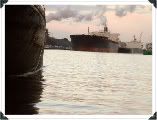 In addition to ports providing the infrastructure to allow ships to plug in to shore power there must also be provision for the ships to be able to take advantage of this as well. Holland America and Princess Cruise ships are able to plug-in in Seattle.⁴
In addition to ports providing the infrastructure to allow ships to plug in to shore power there must also be provision for the ships to be able to take advantage of this as well. Holland America and Princess Cruise ships are able to plug-in in Seattle.⁴
Power provided by the shore electrical grid costs about the same as that generated by diesel on the ship if you discount the investment for a transformer on the ship required to plug-in to the grid.
The cruise ship industry has been a first step because it is in the public eye seem to be more willing to comply with requests. Two container terminals in the inner harbour -- I am assuming that is referring to Coal Harbour or elsewhere on Burrard Inlet between First and Second Narrows -- have the infrastructure in place for wiring to go to the dockside. The new third berth at Deltaport on Robert's Bank will have that infrastructure when it is completed.⁵
There are some hurdles to do with BC Hydro and the BC Utilities Commision in order to develop pricing schems for these customers. The port authority has formally applied to BC Hydro for the interconnecting service.
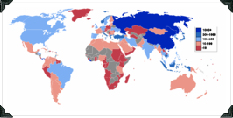 (image to left, 2005 registration of merchant ships - image from Wikipedia⁶)
(image to left, 2005 registration of merchant ships - image from Wikipedia⁶)
There are greater difficulties in dealing with pollution issues in the shipping industry as most of the oceangoing ships are "foreign-flagged" so reducing emissions takes significant amounts of time.³ This action would help with emission issues for when the ships are travelling in and out of harbour -- and of course at sea -- as well as if they have to be running engines for power at anchor. But acting on merchant shipping is something that has to be initiated on an international level -- the International Maritime Organization (IMO), a United Nations agency.³ When regulations are put into effect by the IMO they would be enforced by individual nations and ports. The IMO was looking at revising their 1997 regulations in 2006.⁷
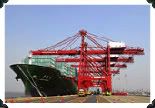 (image to right from Wikipedia⁶)
(image to right from Wikipedia⁶)
Plugging into shore power will solve problems of idling ships which are docked, but for ones at anchor in the harbour... Personally I wonder what solutions might there be other than improved air-pollution standards internationally. Somehow I think that providing docking stations in the harbour at anchorages so that ships could plug in would be prohibitive in cost. Perhaps tenders or barges with huge hydrogen fuel cells might provide these plug-ins? They'd be refuelled and moved where needed. Perhaps in future ships might have hydrogen fuel cells or solar panels for in port and other needs on their own? Perhaps a power barge might have fuel cells, solar panels, wind turbines, and wave power generators all in one? (I can really be a dreamer.)
Perhaps someday there might be solutions for ships at sea, but for now while we think globally we have to act locally and work on the pollution on more local selfish levels like the increase to pollution burdens in our cities.
Later!
~ Darrell
137
__________
¹Metro Vancouver is the name of what was once known as the Greater Vancouver Regional District (GVRD) or colloquially as Greater Vancouver and which Statistics Canada defines as "Vancouver CMA" (Census Metropolitan Area) "having perfectly coterminal boundaries with Metro Vancover" -- Metro Vancouver - Wikipedia, the free encyclopedia.
² "Plug-in power a key to cleaner air" Scott Simpson, Sept 4, 2008; Vancouver Sun.
³ "Air pollution from cargo ships stirs growing concern" Larry Lange, January 20, 2004; Seattle Post-Intelligencer.
⁴ John Hansen, President of the NorthWest CruiseShip Association - Vancouver Sun "Plug-in power a key to cleaner air" Sept 4, 2008
⁵ Darryl Desjardins, Environmental programs director for Port Metro Vancouver - Vancouver Sun "Plug-in power a key to cleaner air" Sept 4, 2008
⁶ "Ship transport" Wikipedia, the free encyclopedia
⁷ "Plan May Ease Air Pollution at Ports" Dan Weikel, July 6, 2006; Los Angeles Times
Unattributed images from Image*After.


 Stumble It!
Stumble It!

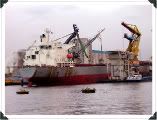
No comments:
Post a Comment